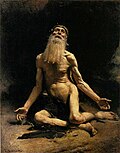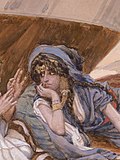Identified by name in the Quran
| Image | Bible (English) | Quran (Arabic) | Rabbinic (Hebrew) | Notes | Bible Verse | Quaranic Verse |
|---|---|---|---|---|---|---|
 | Aaron | Hārūn/ Haarūn | Aharon | Exodus 7:1 | Quran 19:28 [1] | |
 | Abraham | Ibrāhīm/ Ebraheem/ Ebraahym/ Ibrāheem | Avraham | Genesis 17:3–5 | Quran 2:124 | |
 | Adam | Ādam | Adam | Genesis 5:2 | Quran 3:59 | |
 | Amram | ʿImrān/'Emrān | Amram | Islamic tradition holds both Amram and Joachim are named the same. Although Islamic studies of the beginning of the 20th century tended to note genealogical discrepancies, in more recent Islamic Studies of the 21st century the general consensus is that the Quran does not make a genealogical error but instead makes use of typology. [2] This is supported by the figurative speech of the Quran and the Islamic tradition, as words like "sister" and "daughter" can indicate extended kinship, descendance or spiritual affinity. [3] [4] [5] [6] | Exodus 6:20 | Quran 3:33 |
 | King David | Dāwūd/Dā'ūd | Dawid | 1 Samuel 17:58 | Quran 2:251 | |
 | The Apostles | al-Hawariyyūn | Mark 3:16–19 | Quran 61:14 [7] | ||
| | Elijah (Elias) | Ilyās/Elyās | Eliyyahu | 2 Kings 1:8 | Quran 37:123 | |
 | Elisha | al-Yasaʿ | Elishaʿ | Also can be pronounced Alīsaʿ | 1 Kings 19:16 | Quran 6:86 |
 | Enoch | Idrīs | Chanokh | Idris is not universally identified with Enoch, many Muslim scholars of the classical and medieval periods also held that Idris and Hermes Trismegistus were the same person. [8] [9] | Genesis 5:24 | Quran 19:56 |
 | Ezekiel | Ḥizkīl "Dhul-Kifl" | Yechezkel | Ezekiel 1:3 | Quran 38:48 | |
 | Ezra/Esdras | Uzair or Idris | Ezra | Ezra 7:1 | Quran 9:30 | |
 | Gabriel | Jibrīl | Gavri'el | Luke 1:19 | Quran 2:97 | |
 | Gog and Magog | Ya'juj wa-Ma'juj | Gog U-Magog | Ezekiel 38:2 | Quran 21:96 | |
 | Goliath | Jālūṭ | Golyat | 1 Samuel 17:4 | Quran 2:251 | |
 | Isaac | Isħāq | Yitzhak | Genesis 17:19 | Quran 19:49 | |
| Ishmael | Ismāʿīl | Yishmaʿel | Genesis 16:11 | Quran 38:48 | ||
 | Jacob | Yaʿkūb | Yaʿkov | Genesis 32:1 | Quran 19:49 | |
 | Jethro | Shoʿeib | Yitro | Exodus 3:1 | Quran 26:177 | |
 | Jesus | ʿĪsā | Yeshua | Matthew 1:16 | Quran 3:59 | |
 | Joachim or Heli | ʿImrān | Yehoyaqim | Islamic tradition holds both Joachim and Amram are named the same, though the Quran only refers to Joachim with the name of Amram and calls Mary the sister of Aaron, [10] Muslims see this as connecting the two women from two prophetic households in spirit. This question was actually reported to have been put across to Muhammad to which he replied: "The (people of the old age) used to give names (to their persons) after the names of Apostles and pious persons who had gone before them". [11] | Luke 3:23 | |
 | Job | ʾAyyūb | Iyyov | Job 1:1 | Quran 6:84 | |
 | John the Baptist | Yaḥyā | Yohanan | Yaḥyā means 'living' as opposed to Yūḥānna ('graceful'), which comes from Hebrew Yoḥanan. | Luke 1:13 | Quran 19:7 |
 | Jonah | Yūnas/ Yūnes/ Yūnus/ Yūnis "Dhun-Nun" | Yonah | Possibly derived from Greek Ionas | Jonah 3:4 | Quran 37:139 |
 | Joseph | Yūsif | Yosef | Genesis 30:24 | Quran 6:84 | |
 | Lot | Lūṭ | Lot | Genesis 11:27 | Quran 66:10 | |
 | Lot's wife | Lūṭ's wife | She is nameless both in the Bible and in the Quran. | Genesis 19:26 | Quran 26:170 | |
 | Mary | Maryam | Mariam | Matthew 1:16 | Quran 19:34 | |
 | Miriam | Mūsā's sister | Miriam | Exodus 6:20 | Quran 28:11 | |
 | Michael | Mīkāīl | Mikhael | Revelation 12:7 | Quran 02:98 | |
 | Moses | Mūsā | Moshe | Exodus 6:20 | Quran 33:7 | |
 | Noah | Nūḥ | Nōaḥ | Genesis 5:29 | Quran 33:7 | |
 | Pharaoh | Firʿawn | Paroh | Exodus 1:11 | Quran 20:60 | |
 | Queen of Sheba | Queen of Sabaʾ; Bilqīs | Malkat Saba | She is nameless both in the Bible and in the Quran, but the name Bilqīs or Balqīs comes from Islamic tradition. | 1 Kings 10:1 | Quran 27:29 |
 | Saul the King | Ṭālūt | Sha'ul | Literally 'Tall'; Meant to rhyme with Lūṭ or Jālūṭ. | 1 Samuel 17:33 | Quran 2:247 |
 | Devil or Satan | Shaitān / Iblīs | HaSatan | Iblīs, literally 'despaired'; Possibly derived from Greek Diabolus. | Genesis 3:14 | Quran 7:11 |
 | Solomon | Sulaymān | Shlomoh | 1 Kings 10:23 | Quran 34:12 | |
 | Zechariah | Zakariyyā | Zekaryah | Luke 1:13 | Quran 19:7 | |
 | Zimri (prince) | As-Samiriyy | Zimri ben Salu | Al-Samīri is arguably derived from Eastern Syriac 'Zamri, which is derived from Hebrew Zimri. | Numbers 25:14 | Quran 20:85 |






